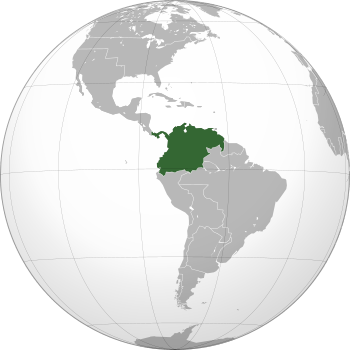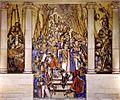Gran Colombia facts for kids
Quick facts for kids
Republic of Colombia
República de Colombia
|
|||||||||||||||||||
|---|---|---|---|---|---|---|---|---|---|---|---|---|---|---|---|---|---|---|---|
| 1821–1831 | |||||||||||||||||||
|
Anthem: Marcha Libertadora
(Liberation March) |
|||||||||||||||||||

Gran Colombia
|
|||||||||||||||||||
| Capital | Bogotá | ||||||||||||||||||
| Common languages | Spanish | ||||||||||||||||||
| Religion | Roman Catholic | ||||||||||||||||||
| Government | Federal Republic | ||||||||||||||||||
| Presidents | |||||||||||||||||||
|
• 1819–30
|
Simón Bolívar | ||||||||||||||||||
|
• 1830, 1831
|
Domingo Caycedo | ||||||||||||||||||
|
• 1830, 1831
|
Joaquín Mosquera | ||||||||||||||||||
| Vice Presidents | |||||||||||||||||||
|
• 1819–20
|
Francisco Antonio Zea | ||||||||||||||||||
|
• 1820–21
|
Juan Germán Roscio | ||||||||||||||||||
|
• 1821
|
Antonio Nariño y Álvarez | ||||||||||||||||||
|
• 1821
|
José María del Castillo | ||||||||||||||||||
|
• 1821–27
|
Francisco de Paula Santander | ||||||||||||||||||
|
• 1830–31
|
Domingo Caycedo | ||||||||||||||||||
| Legislature | Congress | ||||||||||||||||||
|
• Upper Chamber
|
Senate | ||||||||||||||||||
|
• Lower Chamber
|
Chamber of Representatives | ||||||||||||||||||
| History | |||||||||||||||||||
|
• Established
|
December 17 1821 | ||||||||||||||||||
|
• Constitution of Cúcuta
|
August 30, 1821 | ||||||||||||||||||
|
• Colombia – Peru War
|
1828–1829 | ||||||||||||||||||
|
• Disestablished
|
November 19 1831 | ||||||||||||||||||
| Currency | Piastra | ||||||||||||||||||
|
|||||||||||||||||||
| Today part of | |||||||||||||||||||
Gran Colombia was a very large country in South America. It was formed in 1819 after the region called New Granada became independent from Spain. A famous leader named Simón Bolívar helped the rebels defeat the Spanish Empire.
However, after gaining freedom, the different parts of Gran Colombia started to disagree. By 1831, Venezuela and Ecuador decided to become separate countries. The land that was left became what we now know as Colombia. Many years later, Panama also became its own country, separating from Colombia.
Contents
What Was Gran Colombia?
Gran Colombia was a huge republic that existed for about 12 years. It included lands that are now Colombia, Venezuela, Ecuador, and Panama. It also covered parts of northern Peru, western Guyana, and northwest Brazil.
Why Was It Formed?
The idea for Gran Colombia came from Simón Bolívar. He dreamed of uniting all the former Spanish colonies in South America into one strong nation. This would help them stay independent and protect themselves from other powerful countries.
The Fight for Freedom
Before Gran Colombia, these lands were under Spanish rule for centuries. The people wanted freedom and their own governments. The Spanish American wars of independence were a series of conflicts where people fought against Spain. Bolívar was a key general in these wars. His victories helped create Gran Colombia.
Key Leaders of Gran Colombia
The country had several important leaders during its short life.
Simón Bolívar: The Liberator
Simón Bolívar was the first and most important leader. He was known as "The Liberator" because he helped free many South American countries from Spanish rule. He served as president of Gran Colombia from 1819 to 1830. He worked hard to keep the new country united.
Francisco de Paula Santander
Another important leader was Francisco de Paula Santander. He was the Vice President for a long time, from 1821 to 1827. While Bolívar was often away fighting battles, Santander helped manage the country's government.
How Gran Colombia Was Governed
Gran Colombia was set up as a federal republic. This meant it had a central government, but different regions also had some power.
The Constitution of Cúcuta
In 1821, a very important meeting happened at the Congress of Cúcuta. Here, leaders wrote the first constitution for Gran Colombia. This document set up the rules for how the country would be run. It created a Congress with two parts: a Senate and a Chamber of Representatives.
Why Gran Colombia Broke Up
Even though Bolívar wanted a strong, united country, Gran Colombia faced many challenges. These problems eventually led to its breakup.
Differences Between Regions
The different regions of Gran Colombia had their own histories and ways of life. People in Venezuela, Ecuador, and New Granada (Colombia and Panama) often felt more loyal to their own regions than to the big country. They had different ideas about how the government should work.
Political Disagreements
Leaders like Bolívar and Santander had different ideas about how the country should be run. Bolívar wanted a strong central government, while others wanted more power for the regions. These disagreements caused a lot of tension.
Economic Problems
The new country also faced economic challenges. It was expensive to run a large country and recover from years of war. There were not enough resources to satisfy everyone.
Wars and Conflicts
Gran Colombia was also involved in some wars, like the Gran Colombia – Peru War from 1828 to 1829. These conflicts put more strain on the young nation.
The End of Gran Colombia
By 1830, the tensions became too strong. Venezuela and Ecuador decided to leave Gran Colombia and form their own independent countries. Bolívar was very sad about this and died shortly after. The remaining part of Gran Colombia became the Republic of New Granada, which later changed its name to Colombia.
Images for kids
-
A mural by Santiago Martinez Delgado at the Colombian Congress representing the Congress of Cúcuta
-
A map of Gran Colombia showing the 12 departments created in 1824 and territories disputed with neighboring countries
See also
 In Spanish: Gran Colombia para niños
In Spanish: Gran Colombia para niños
 | Aaron Henry |
 | T. R. M. Howard |
 | Jesse Jackson |






